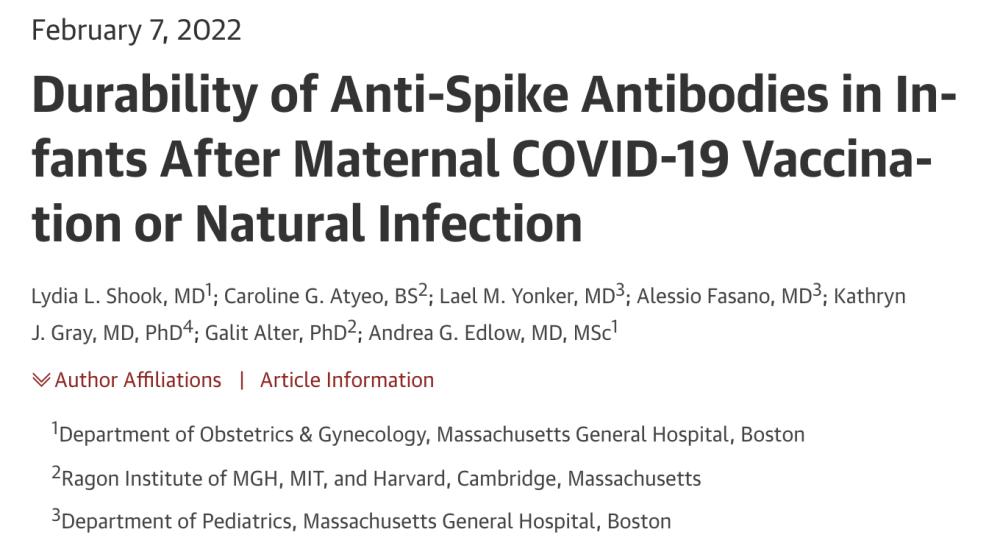The COVID-19 pandemic is in its third year, and efforts to reduce the risk of infection remain critical. How can groups with weak immune protection prevent the epidemic? It has long attracted much attention.
On February 7, local time, the top journal "Journal of the American Medical Association " ( JAMA ) published a study jointly completed online by the Massachusetts General Hospital (MGH) and Brigham women's hospital in the form of research letters. The study showed that babies born to pregnant women who were vaccinated during pregnancy had more durable antibody levels than babies born to unvaccinated, covid-19 mothers.

Citing previous research, the research team said that covid-19 vaccination during pregnancy can produce functional anti-spike protein (anti-S) IgG antibodies in the mother, which can be detected in the cord blood of pregnant women during childbirth, protecting newborns and infants from new coronavirus infection. Previous studies have also found that the titer of the anti-spike protein IgG antibody in cord blood is correlated with the titer in the mother, with the highest after vaccination in the third trimester and early trimester. That is, during this window of 20 to 32 weeks of gestation, antibodies are better transferred through the placenta.
How persistent is the vaccine-induced maternal anti-spike protein IgG in the blood of infants? How do antibodies brought by maternal vaccination during pregnancy and antibodies brought by natural infections affect babies differently? These are the questions the latest study seeks to shed further.
The study studied pregnant women who had received two doses of the mRNA vaccine or had been infected with the new coronavirus at 20 to 32 weeks' gestation and included the children they gave birth in later follow-up studies. Ultimately, 77 pregnant women who received the vaccine and 12 patients with symptomatic SARS-CoV-2 infection during pregnancy were included in the study. Capillary serum samples from 49 vaccinated mothers were collected at the 2 months of delivery, and at 6 months, serum samples were collected from 28 vaccinated mothers (average 170 days after birth) and 12 infants from mothers infected with the virus (average 207 days after birth).
The study found that vaccinated mothers and their cord blood had higher titers or antibody levels during delivery than those study participants who contracted COVID. After 2 months, 98% (48 out of 49 infants) levels of protective immunoglobulin G (IgG) were detectable in infants born to vaccinated mothers, the most common antibody in the blood.
Antibody persistence in infants from vaccinated mothers was also significantly higher than in the infected group. At 6 months, the researchers looked at 28 babies born to vaccinated mothers and found that 57 percent (16 out of 28 babies) still contained detectable IgG. In contrast, this proportion of children born to mothers who have been infected with the virus is only 8% (1 in 12 babies).
After the mother receives the COVID-19 vaccine or natural infection, the level of antibodies in the baby's body.
Andrea Edlow, a maternal-fetal medicine specialist at Massachusetts General Hospital and corresponding author of the study, said, "While it is unclear how high the titers are needed to completely protect infants from COVID-19, we know that anti-stinging protein IgG levels are associated with protecting infants from serious disease." ”
She mentioned, "The persistence of the antibody response suggests that vaccination not only provides lasting protection for the mother, but that antibodies in most babies last at least up to 6 months of age." "Previously, everyone from parents to pediatricians wanted to know how long the antibodies that mothers get after vaccination last in the baby," and now we can provide some answers. ”
In the article, the research team stresses that it is important to understand the persistence of antibody levels from mothers in infants, because COVID-19 infection in this age group accounts for a disproportionate burden of COVID-19-related incidence in children. In addition, there is no COVID-19 vaccine approved for infants under 6 months of age. "We hope these findings will provide further incentives for pregnant women to vaccinate, especially as new variants like Omi Kerong emerge."
"Pregnant women are at very high risk of serious complications of COVID-19." Dr. Galit Alter, a core member of the Harvard University and MIT's Lagun Institute and co-corresponding author of the study, added, "Given the lagging development of a COVID-19 vaccine for infants, these data should motivate mothers to vaccinate and even step up vaccination during pregnancy to strengthen infant resistance to THE coronavirus." ”
Original link: https://jamanetwork.com/journals/jama/fullarticle/2788986?resultClick=3